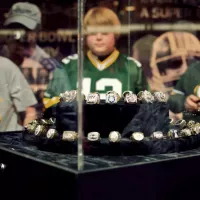Minnesota is a U.S. state in the Upper Midwest, bordered by Canada and the U.S. states of Wisconsin, Iowa, North Dakota, and South Dakota. Known as the "Land of 10,000 Lakes," it features a landscape of forests, prairies, and farmland. With a population of approximately 5.8 million, it is the 22nd-most populous U.S. state. The Minneapolis–Saint Paul metropolitan area, the "Twin Cities," is the state's main political, economic, and cultural center. Other significant metropolitan areas include Duluth, Mankato, Moorhead, Rochester, and St. Cloud.
1900: Minnesota mills grind nation's grain
By 1900, Minnesota mills, led by Pillsbury, Northwestern, and the Washburn-Crosby Company, were grinding 14.1% of the nation's grain.
1901: Washington Senators Founding Member
In 1901, the Twins began play as the original Washington Senators, a founding member of the American League.
1922: KUOM-AM Launched
In 1922, KUOM-AM, the state's oldest radio station, was launched. It is among the 10-oldest radio stations in the United States.
September 1927: John Philip Sousa and his band gave premiere performance of "The Minnesota March"
In September 1927, John Philip Sousa and his band premiered "The Minnesota March" at the Minnesota State Fair before a crowd of 12,000.
1931: Drought hits western Minnesota
In 1931, western Minnesota and the Dakotas were hit by drought, which compounded the economic adversity of the Great Depression.
1934: Indian Reorganization Act
In 1934, the Indian Reorganization Act provided tribes with a mechanism of self-government, giving Natives a greater voice within the state and promoting more respect for tribal customs.
1935: Drought hits western Minnesota
From 1931 to 1935, western Minnesota and the Dakotas were hit by drought, compounding the adversity of the Great Depression.
July 6, 1936: Highest temperature recorded in Minnesota
On July 6, 1936, the highest temperature recorded in Minnesota was 114 °F (46 °C) at Moorhead.
1944: Minnesota Democratic–Farmer–Labor Party formed
In 1944, the Minnesota Democratic–Farmer–Labor Party (DFL) was formed out of an alliance of the Minnesota Democratic and Farmer–Labor parties.
1946: Engineering Research Associates formed
In 1946, Engineering Research Associates was formed to develop computers for the United States Navy.
1947: Minneapolis Lakers Played in Minneapolis Auditorium
From 1947, the Minneapolis Lakers of the National Basketball Association played in the Minneapolis Auditorium.
April 27, 1948: KSTP-TV began broadcasting
On April 27, 1948, KSTP-TV started broadcasting, marking the beginning of broadcast television in Minnesota and the Upper Midwest.
1948: Hubert Humphrey's address at the 1948 Democratic National Convention brought national attention to Minnesota
In 1948, Hubert Humphrey's address at the Democratic National Convention brought national attention to Minnesota.
1949: Medtronic starts business
In 1949, Medical device maker Medtronic also started business in the Twin Cities.
1951: Minneapolis Hosted NCAA Men's Division I Basketball Championship
In 1951, Minneapolis hosted the NCAA Men's Division I Basketball Championship.
1957: William Norris forms Control Data Corporation
In 1957, William Norris left Sperry to form Control Data Corporation (CDC).
1957: Planning commission created for Twin Cities
In 1957, the legislature created a planning commission for the Twin Cities metropolitan area.
1960: Minneapolis Lakers Relocated to Los Angeles
In 1960, the Minneapolis Lakers relocated to Los Angeles.
1960: Minnesota begins voting for the Democratic nominee in every presidential election
Minnesota has voted for the Democratic nominee in every presidential election since 1960, with one exception.
1961: Minnesota Vikings Admission
In 1961, the Minnesota Vikings joined the National Football League as an expansion franchise and played in Metropolitan Stadium.
1961: Minnesota Twins in the Twin Cities
Since 1961, the Minnesota Twins have played in the Major League Baseball in the Twin Cities after relocating from Washington.
1965: Twins Advanced to 1965 World Series
In 1965, the Minnesota Twins advanced to the World Series, where they lost to the Los Angeles Dodgers in seven games.
1967: Minnesota North Stars Competed in NHL
From 1967, the Minnesota North Stars competed in NHL.
1967: Metropolitan Council formed
In 1967, the planning commission for the Twin Cities metropolitan area became the Metropolitan Council.
1971: "Minnesota Miracle" legislation
In 1971, under Governor Wendell Anderson, legislation called the "Minnesota Miracle" led to a broad reform in financing of Minnesota public schools and local governments.
1972: Minnesota voted for Republican Richard Nixon in presidential election
In 1972, Minnesota was won by Republican Richard Nixon, the only presidential election since 1960 where the state did not vote for the Democratic nominee.
1974: A Prairie Home Companion first aired
In 1974, the comedy radio show "A Prairie Home Companion" first aired on National Public Radio.
1976: Minnesota Kicks Played at Metropolitan Stadium
From 1976, the Minnesota Kicks played at Metropolitan Stadium.
1976: Minnesota begins casting Electoral College votes for Democratic presidential candidates
Since 1976, Minnesota has consistently cast their Electoral College votes for Democratic presidential candidates, longer than any other state.
1976: Democratic presidential nominee support
Since 1976, Minnesota has consistently voted for the Democratic presidential nominee, making it a reliable base for the Democratic Party, a streak longer than any other U.S. state.
1980: Population changes in Minnesota counties
Between 1980 and 2000, the populations of metropolitan Sherburne and Scott counties doubled.
1980: Gold Medal 1980 Ice Hockey Team
In 1980, twelve of the twenty members of the gold medal ice hockey team (coached by Minnesota native Herb Brooks) were from Minnesota.
1981: Vikings Last Season at Metropolitan Stadium
1981 was the last season the Minnesota Vikings played in Metropolitan Stadium.
1981: Minnesota North Stars Lost Stanley Cup Finals
In 1981, the Minnesota North Stars played in and lost the Stanley Cup Finals.
1981: Minnesota Kicks Played at Metropolitan Stadium
Until 1981, the Minnesota Kicks played at Metropolitan Stadium.
1982: Vikings Play in the Hubert H. Humphrey Metrodome
From 1982, the Minnesota Vikings played in the Hubert H. Humphrey Metrodome.
1984: Minnesota Strikers
From 1984, there were the Minnesota Strikers.
1987: Twins Won 1987 World Series
The Minnesota Twins won the 1987 World Series in seven-game matches.
1988: Minnesota Strikers
Until 1988, there were the Minnesota Strikers.
1990: Minnesota Timberwolves Played in Target Center
Since 1990, the Minnesota Timberwolves have played in Target Center.
1990: DFL party had same-party control of both legislative and executive branches
Two years after the 2010 election, the DFL regained control of both houses, and with Dayton in office, the party had same-party control of both the legislative and executive branches for the first time since 1990.
1991: Minnesota North Stars Lost Stanley Cup Finals
In 1991, the Minnesota North Stars played in and lost the Stanley Cup Finals.
1991: Twins Won 1991 World Series
The Minnesota Twins won the 1991 World Series in seven-game matches.
1992: Minneapolis Hosted NCAA Men's Division I Basketball Championship
In 1992, Minneapolis hosted the NCAA Men's Division I Basketball Championship.
1992: Super Bowl XXVI Played in the Metrodome
In 1992, Super Bowl XXVI was played in the Hubert H. Humphrey Metrodome.
1993: Minnesota North Stars End in NHL
In 1993, the Minnesota North Stars' time in the NHL ended.
1993: KUOM-AM Broadcasts College Rock Format
Since 1993, KUOM-AM broadcasts a college rock format.
February 2, 1996: Lowest temperature recorded in Minnesota
On February 2, 1996, the lowest temperature recorded in Minnesota was −60 °F (−51 °C) at Tower.
1996: Tom Malchow Won Olympic Silver Medal
In 1996, swimmer Tom Malchow won an Olympic silver medal.
1998: Jesse Ventura elected governor of Minnesota
In 1998, former mayor of Brooklyn Park and professional wrestler Jesse Ventura was elected governor of Minnesota under the Reform Party, now the Independence Party.
2000: Population changes in Minnesota counties
Between 1980 and 2000, 40 of Minnesota's 87 counties lost residents.
2000: Tom Malchow Won Olympic Gold Medal
In the 2000 Summer Olympics, swimmer Tom Malchow won an Olympic gold medal.
2001: Minneapolis Hosted NCAA Men's Division I Basketball Championship
In 2001, Minneapolis hosted the NCAA Men's Division I Basketball Championship.
2005: Minnesota ranked as the healthiest state in the nation
In 2005, Minnesota was ranked as the healthiest state in the nation.
2005: 2% biodiesel blend required in diesel fuel
Since 2005, Minnesota has required a 2% biodiesel blend in all diesel fuel.
2006: Constitutional amendment passed requiring sales and use taxes on motor vehicles to fund transportation
In 2006, a constitutional amendment was passed in Minnesota that required sales and use taxes on motor vehicles to fund transportation, with at least 40% dedicated to public transit.
2006: Guthrie Theater moved to new Minneapolis facility
In 2006, the world-renowned Guthrie Theater relocated to a new facility in Minneapolis, featuring three stages and overlooking the Mississippi River.
2006: Bronze Medal U.S. Men's Curling Team
In the 2006 Winter Olympics, the U.S. men's curling team won the bronze medal.
2006: Democrats elected to all state offices except governor and lieutenant governor
In the 2006 mid-term election, Democrats were elected to all state offices, except governor and lieutenant governor. Keith Ellison (DFL) was elected as the first African American U.S. Representative from Minnesota, as well as the first Muslim elected to Congress nationwide.
October 1, 2007: Freedom to Breathe Act takes effect
On October 1, 2007, the Freedom to Breathe Act took effect, outlawing smoking in restaurants and bars in Minnesota.
2007: Minnesota has most breeding pairs of bald eagles
As of 2007, Minnesota had the largest number of breeding pairs of bald eagles in the lower 48 states.
January 16, 2008: Minnesota Wild Sold-Out Games
On January 16, 2008, the National Hockey League's Minnesota Wild reached 300 consecutive sold-out games.
2008: Minnesota ranked 12th in nation in per capita total state and local taxes
As of 2008, Minnesota was ranked 12th in the nation regarding per capita total state and local taxes. In 2008, Minnesotans paid 10.2% of their income in state and local taxes, while the U.S. average was 9.7%.
2008: Al Franken defeated Norm Coleman in U.S. Senate race
In 2008, DFLer Al Franken defeated incumbent Republican Norm Coleman in the U.S. Senate race by 312 votes out of three million cast.
2008: Minnesota had highest voter turnout in U.S. presidential election
In the 2008 U.S. presidential election, Minnesota had the highest voter turnout of any U.S. state, with 78.2% of eligible Minnesotans voting.
2009: Minnesota descended from first to sixth in the nation in health rankings
In 2009, Minnesota descended from first to sixth in the nation in health rankings due to low levels of public health funding and binge drinking.
2009: Minnesota had the second-highest proportion of high school graduates
In 2009, according to the U.S. Census Bureau, Minnesota had the second-highest proportion of high school graduates, with 91.5% of people 25 and older holding a high school diploma.
2010: Minnesota United FC Played in NASL
From 2010, Minnesota United FC played in the lower-division North American Soccer League.
2010: Republicans took control of both chambers of the Minnesota legislature
In the 2010 election, Republicans took control of both chambers of the Minnesota legislature for the first time in 38 years, and the DFL party took the governor's office for the first time in 20 years.
2011: Minnesota Lynx Winners of the WNBA Championship
In 2011, the Minnesota Lynx won the WNBA Championship.
2013: Metrodome Demolition
After the 2013 season, the Hubert H. Humphrey Metrodome was demolished for the construction of the U.S. Bank Stadium, the team's new home.
2013: Minnesota ranked eighth in the world in math and science performance
In 2013, a study by the National Center for Educational Statistics found that Minnesota ranked eighth in the world and third in the United States in math and science performance for eighth-grade students.
2013: Minnesota Lynx Winners of the WNBA Championship
In 2013, the Minnesota Lynx won the WNBA Championship.
2014: Religious affiliations in Minnesota
As of 2014, 74% of Minnesotans identified as Christian, 5% belonged to non-Christian faiths, and 20% identified as religiously unaffiliated, according to the Pew Research Center.
2014: Minnesota students earned the tenth-highest average composite score on the ACT exam
In 2014, Minnesota students earned the tenth-highest average composite score in the nation on the ACT exam.
2014: Minnesota State Fair sets new attendance record
In 2014, the Minnesota State Fair, advertised as The Great Minnesota Get-Together, set a new attendance record with more than 1.8 million visitors.
2015: Minneapolis named the nation's "Most Literate City"
In 2015, Minneapolis was named the nation's "Most Literate City", while St. Paul placed fourth, according to a major annual survey.
2015: Minnesota Lynx Winners of the WNBA Championship
In 2015, the Minnesota Lynx won the WNBA Championship.
2015: Minnesota Swarm Moved to Georgia
In 2015, the Minnesota Swarm of the National Lacrosse League moved to Georgia.
2016: Bob Dylan won the 2016 Nobel Prize in Literature
In 2016, Minnesota native Bob Dylan won the Nobel Prize in Literature.
2016: GOP regained control of the State Senate
In 2016, the GOP regained control of the Minnesota State Senate.
2016: Minnesota produces usable iron ore
In 2016, the state of Minnesota produced 60% of the country's usable iron ore.
2016: Hazeltine National Golf Club Hosted Ryder Cup
In the fall of 2016, the Hazeltine National Golf Club hosted the Ryder Cup, becoming one of two courses in the U.S. to host all major golf competitions.
2016: Minnesota United FC Played in NASL
Until 2016, Minnesota United FC played in the lower-division North American Soccer League.
2017: Minnesota United FC Joined Major League Soccer
In 2017, Minnesota United FC joined Major League Soccer as an expansion team.
2017: Minnesota Lynx Winners of the WNBA Championship
In 2017, the Minnesota Lynx won the WNBA Championship.
2017: Ancestry groups in Minnesota
In the 2017 American Community Survey, the largest ancestry groups claimed by more than 5% of Minnesota's population were German (33.8%), Norwegian (15.3%), Irish (10.5%), Swedish (8.1%), and English (5.4%).
February 2018: U.S. Bank Stadium Hosted Super Bowl LII
In February 2018, the Minnesota Vikings' current stadium, U.S. Bank Stadium, hosted Super Bowl LII.
2018: Minnesota's refugee population
As of 2018, Minnesota had the largest refugee population per capita of any state, with 2% of the country's population but 13% of its refugees.
2018: Gold Medal-Winning Team from Duluth
At the 2018 Winter Olympics, the gold medal-winning curling team was from Duluth.
2018: DFL retook control of the Minnesota House
In 2018, the DFL retook control of the Minnesota House, while electing DFLer Tim Walz as Governor.
January 7, 2019: Tim Walz took office as Minnesota's governor
On January 7, 2019, Tim Walz, a DFLer, took office as Minnesota's governor.
2019: Minneapolis Hosted NCAA Men's Division I Basketball Championship
In 2019, Minneapolis hosted the NCAA Men's Division I Basketball Championship.
2019: MPR Broadcasting on 46 Radio Stations
In 2019, Minnesota Public Radio (MPR) was broadcasting on 46 radio stations, making it the largest regional public radio network in the nation.
2019: More than 411 service stations supplying E85 fuel
In 2019, Minnesota had more than 411 service stations that supplied E85 fuel, which is comprised of 85% ethanol and 15% gasoline.
2019: Minnesota's gross domestic product
In 2019, Minnesota's economy had a gross domestic product of $383 billion.
2019: Minnesota's per capita personal income
Minnesota's per capita personal income in 2019 was $58,834, the thirteenth-highest in the nation.
2020: Minnesota population
According to the United States Census Bureau, Minnesota had a population of about 5.7 million in 2020, making it the 22nd-most populous U.S. state.
2020: Racial demographics in Minnesota
As of 2020, the white population in Minnesota had fallen to 77.5% from over 98% in the early to mid-20th century, while the Black population rose to 7%, the Asian population to 5.3%, and those identifying as two or more races to 6.1%.
2020: Minnesota cities with populations above 50,000
As of the 2020 census, Minnesota has 17 cities with populations above 50,000, including Minneapolis, Saint Paul, Rochester, and Duluth.
2020: Minnesota surpassed previous voter turnout record
In 2020, Minnesota surpassed its previous voter turnout record, with 79.96% of registered voters participating in the general election.
2020: Mayo Clinic ranked first on the best hospitals honor roll
In 2020, U.S. News & World Report ranked hospitals in the country, and the Mayo Clinic was placed first on the best hospitals honor roll.
2020: Minnesota ranked as the 15th easiest state for citizens to vote in
In a 2020 study, Minnesota was ranked as the 15th easiest state for citizens to vote in.
2021: Minnesota fertility rate
Minnesota's fertility rate in 2021 was slightly below the replacement rate at 1.75.
2023: DFL gains control and passes reforms
In 2023, the DFL (Democratic–Farmer–Labor Party) gained control of all three branches of Minnesota's government and passed significant reforms, moving the state in a progressive direction.
2023: The House and Senate have a slim DFL majority
Since 2023, both the Minnesota House and Senate have had a slim DFL majority.
2024: Tim Walz was Kamala Harris's running mate in the 2024 presidential election
In 2024, Tim Walz was Kamala Harris's running mate in the United States presidential election.
2025: Largest employers
As of 2025, Minnesota's largest employers were:
2028: Ryder Cup Scheduled to Return
The Ryder Cup is scheduled to return to the Hazeltine National Golf Club in 2028.
Mentioned in this timeline

Basketball is a team sport played on a rectangular court...
Ukraine is a country in Eastern Europe the second-largest on...

Bob Dylan is a highly influential American singer-songwriter renowned as...
California is a U S state on the Pacific Coast...
India officially the Republic of India is a South Asian...

The Super Bowl is the annual championship game of the...
Trending

26 minutes ago Pink and Carey Hart Separate Again After 20 Years: Relationship Update

26 minutes ago Rueben Bain Jr. Addresses Arm Length Concerns at NFL Combine, Focus Remains on Play

27 minutes ago Former LSU receiver Devonta Lee tragically passes away at 27, leaving football world mourning.

2 hours ago Jonathan Majors' Movie Comeback and Meagan Good's Support Spark Public Interest.

2 hours ago Randy Orton eyes 15th WWE Championship reign at Elimination Chamber 2026.
2 hours ago Europa League Round of 16 Draw: Date, Time, Format, and Ticket Details
Popular

Jesse Jackson is an American civil rights activist politician and...

Susan Rice is an American diplomat and public official prominent...

Barack Obama the th U S President - was the...

XXXTentacion born Jahseh Dwayne Ricardo Onfroy was a controversial yet...

Michael Joseph Jackson the King of Pop was a highly...

Michael Jordan widely considered one of basketball's greatest players significantly...